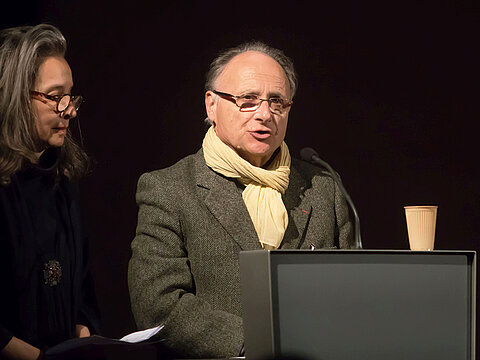On 11 April 2020, the Buchenwald camp bell will ring out to commemorate the 75th anniversary of the liberation of the Nazi concentration camp at Buchenwald.
Each and every one of us, former deportees, their descendants and families, as well as bearers of memory and citizens, had longed to congregate on the hill of Ettersberg in order to gather for this memorable event to jointly commemorate, reflect, and remember. We had also hoped do so in Nordhausen and on the various sites in the satellite camps.
Regrettably, the tragic events resulting from the coronavirus pandemic have hampered our plans. The camps’ former internees and detainees will not be able to partake at the event at the German National Theatre in Weimar, which they were due to attend, nor at the former parade grounds in the Buchenwald and Dora Memorials. Nor will they be able to participate in the various meetings that had been scheduled with schoolchildren and young people. We will be deprived of those precious moments of friendship with our Elders. Their voices will not be heard. The presence of these former inmates and detainees is irreplaceable; it greatly amplifies the scope of their message. Their appearance at these acts of remembrance and their personalities vividly bring to life these pages of history that seem so distant.
If these commemorations afford us an occasion on which we can revisit and explain the past, they are equally wonderful moments in which we can get together again and fraternize.
Covid-19 has shattered this dynamic. This pandemic, however, has at once highlighted our weaknesses and our strengths: it reveals how much we have withdrawn into ourselves and yet highlights our humanitarian impulses, thereby underlining the paradox of having to restrict ourselves while at the same time demonstrating enormous energy in order to generate solidarity.
This predicament raises fundamental questions, all while opening up fresh perspectives. One of the persisting questions at the heart of our reflections is how we will gather and commemorate the victims at the actual historical sites of their suffering in the spirit of the Buchenwald Oath.
Seventy-five years ago, Hans Eiden, a German political prisoner at the camp, in his role as the camp’s elder declared: “Comrades, we are free!” The political and structured resistance at the camp had secured a crucial victory. Joy, however, intermingled with an omnipresent sense of grief for those victims who had not survived. From the memory of these victims emerged an all-inclusive conviction –– beyond national differences, beyond diverging worldviews, cultures, expectations, and differences of opinion–– that was articulated in the Buchenwald Oath:
Our watchword is the destruction of Nazism from its roots.
Our goal is to build a new world in peace and freedom.
This unconditional commitment has become a legacy.
The International Buchenwald Dora Committee and Commandos (IBDC) is heir to this pledge and its duty is to uphold it.
As the heir to this pledge, the International Buchenwald Dora Committee is determined to crush Nazism and Fascism, ideologies that have spawned nationalism, dictatorships, apologies for violence, exclusion, hatred, massacres and genocides, and which led to a war of annihilation.
Remaining faithful to the spirit of the Oath, we roundly reject those historical untruths that place all “victims of totalitarian and authoritarian regimes” on an equal footing, as the European Parliament has done.
It is with the utmost concern that the IBDC notes how local authorities have dismissed objections raised against the exploitation of authentic remembrance sites for commercial purposes in order to preserve the historic sites of the satellite camps of Buchenwald and Dora. This deafness has resulted in far-right groups using the historic sites of the former Hasag Kommando in Leipzig as a training centre for martial arts. Elsewhere, the municipality of Mühlhausen authorized plans to build a museum devoted to sausages adjacent to the site of a Nazi death camp annex.
The IBDC respects and supports the work of the Buchenwald and Mittelbau-Dora Memorial Foundation; it also thanks the state of Thuringia and it employees, the local authorities in Weimar, as well as all those organizations engaged with remembrance for their moral and political commitment.
The IBDC has constantly endeavoured to denounce––whether alone or in conjunction with other international camp committee–– the scourges of racism, anti-Semitism, any stigmatization of the Sinti and Roma, migrants, or any protectionist reflexes that exclude any human being from the human community. It is committed to continue these combats.
The experiences of those devasting years under National Socialism, as well as the voices of the deportees and those interned in Nazi camps, have resolutely contributed to the most crucial decisions taken to maintain peace between nations, as well as for social and cultural progress. We are proud of these accomplishments and we regard it as our duty to do our utmost to ensure that this never be forgotten.
Recent political developments in Thuringia and across Germany, as well as in many other nations throughout Europe, Asia, and the Americas, pose grave challenges which we have to tackle given the manner in which they have alarmingly spread. They deeply and fundamentally violate the values embodied in the Buchenwald Oath.
The IBDC’s duties are manifold: to explain the genesis and consequences of Nazism and Fascism; to preserve the memory of all victims deported and interned in the Nazi camps; and to transmit their message. It is our duty today as it will be tomorrow, for today, even seventy-five years after the liberation of the Buchenwald concentration camp, a new world of peace and freedom, justice and dignity does not yet exist for every human being.
The International Comittee Buchenwald Dora and Commandos, 11 April 2020

Dominique Durand, President of the ICBD, at a meeting with relatives of Buchenwald prisoners at the Buchenwald Memorial, 14 April 2019
